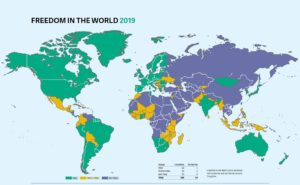This week on The Score: Is freedom in the world declining? Why are American drug prices so high? Was the President accurate about immigration and trade in his State of the Union message? What’s the full story on jobs and wages? And we remember radio host Doc Thompson.
http://bearingdrift.com/wp-content/uploads/TheScore-Feb9-fullhour.mp3 [1]Last Tuesday, we heard from President Trump in his second State of the Union Address. Later on this episode of The Score, a couple of free-market economists respond to the President’s claims and proposals.
Freedom in the World
 But first, for more than four decades, the Washington-based Freedom House [2] has been producing annual reports on the state of Freedom in the World [3]. This year’s report marks thirteen years of deteriorating democracies and declines in the measures of freedom.
But first, for more than four decades, the Washington-based Freedom House [2] has been producing annual reports on the state of Freedom in the World [3]. This year’s report marks thirteen years of deteriorating democracies and declines in the measures of freedom.
I went to the Freedom House office and spoke with Sarah Repucci, the organization’s senior director for research and analysis. Before joining Freedom House, Repucci worked for Transparency International and the Global Business Initiative on Human Rights, and as an independent consultant for a range of NGOs, bilateral and multilateral organizations, and private businesses. You can follow her on Twitter at @sararepucci [4]. Freedom House is also on Twitter, as (naturally) @FreedomHouse [5].
In this interview, we discuss bright spots in the report, such as Ethiopia, but also worrisome situations in Hungary, Venezuela, and the United States. If that last-named country seems jarring, it’s noteworthy that the U.S. score in Freedom House’s report has been declining for almost a decade. From the report’s summary:
Challenges to American democracy are testing the stability of its constitutional system and threatening to undermine political rights and civil liberties worldwide. As part of this year’s report, Freedom House offers a special assessment of the state of democracy in the United States midway through the term of President Donald Trump. While democracy in America remains robust by global standards, it has weakened significantly over the past eight years, and the current president’s ongoing attacks on the rule of law, fact-based journalism, and other principles and norms of democracy threaten further decline.
Having observed similar patterns in other nations where democracy was ultimately overtaken by authoritarianism, Freedom House warns that the resilience of US democratic institutions in the face of such an assault cannot be taken for granted….
The United States currently receives a score of 86 out of 100 points. While this places it below other major democracies such as France, Germany, and the United Kingdom, it is still firmly in the Free category. Nevertheless, its decline of eight points in as many years is significant. The United States’ closest peers with respect to total Freedom in the World scores are Belize, Croatia, Greece, Latvia, and Mongolia.
Drug Prices
Speaking before Congress [6] last Tuesday, President Trump said:
The next major priority for me, and for all of us, should be to lower the cost of healthcare and prescription drugs — and to protect patients with pre-existing conditions.
Already, as a result of my Administration’s efforts, in 2018 drug prices experienced their single largest decline in 46 years.
But we must do more. It is unacceptable that Americans pay vastly more than people in other countries for the exact same drugs, often made in the exact same place. This is wrong, unfair, and together we can stop it.
I am asking the Congress to pass legislation that finally takes on the problem of global freeloading and delivers fairness and price transparency for American patients. We should also require drug companies, insurance companies, and hospitals to disclose real prices to foster competition and bring costs down.
Addressing the topic of high prescription drug prices, Phil Kerpen wrote in a recent article [7]:
Americans are justifiably angry that we pay the highest prescription drugs prices in the world – anger President Trump tapped into on the campaign trail. The disparity exists because other rich countries use price control schemes, forcing American consumers to provide the returns on capital that justify the enormous research and development costs associated with bringing new cures to market; the rest of the world free-rides on our innovation.
The good news is that the Trump administration has been aggressive on the trade front in efforts to break foreign price control regimes; the bad news is that the Trump administration is also proposing to actually import foreign price control regimes into the Medicare program by adopting a payment formula that is pegged to foreign prices.
Kerpen has been a guest on The Score at least [8] twice in the past [9], talking about regulatory policy. He is president of American Commitment [10], which, according to its web site, “engages in critical public policy fights over the size and intrusiveness of government through direct advocacy, strategic policy analysis, and grassroots mobilization. Working with key partners, American Commitment delivers timely, effective public policy research to the broader free-market movement.” This week we talked to him about what causes high drug prices in the United States, how profits drive innovation, and what we can expect in the news on this subject over the next year. Phil Kerpen is on Twitter as @kerpen [11].
Immigration, Trade, Economic Policy
The day after President Trump delivered his State of the Union message to Congress, I went to the Mercatus Center at George Mason University in Arlington, Virginia, to get assessments of the speech from two of the center’s economists.
Both Michael Farren [12] and Daniel Griswold [13] have been guests on previous episodes of The Score.
I talked to Griswold about two major issues that the President hit on in his speech, immigration and trade. Griswold recently published [14] a policy paper called “Mirror, Mirror, on the Wall: The Danger of Imposing ‘Reciprocal’ Tariff Rates,” which argues that “suggestions for higher ‘reciprocal’ tariffs on goods entering the United States imported from countries that impose higher tariffs than the United States would be an economic and administrative nightmare—and a policy mistake of historic proportions.” (Follow Dan Griswold on Twitter at @DanielGriswold [15].)
I queried Farren about the general economic themes of the State of the Union address, but first asked for his reaction to the latest employment statistics from the Department of Labor. On that topic, he wrote a commentary on February 1 [16] headlined “Groundhog Day Jobs Report: Economy Fails to See the Shadow of Government Shutdown.” (Watch his tweets at @MichaelDFarren [17].)
From the Archives
 Virginia radio listeners were sad to learn this past week of the sudden death of Doc Thompson [18], who for five years hosted a talk show on WRVA in Richmond. He was struck by a train while jogging in Texas. In recent years, Thompson hosted a show on Glenn Beck’s TheBlaze radio.
Virginia radio listeners were sad to learn this past week of the sudden death of Doc Thompson [18], who for five years hosted a talk show on WRVA in Richmond. He was struck by a train while jogging in Texas. In recent years, Thompson hosted a show on Glenn Beck’s TheBlaze radio.
In August 2010, I interviewed Doc Thompson about that year’s political scene, including the emerging tea party movement and the midterm elections. Here’s an excerpt [19]:
“Personally, I live my life with fairly conservative leanings,” Thompson explained, but “I take a little bit of a step toward libertarian when it comes to government, in that I want to be left alone. Yes, I’m a conservative, and I have conservative values, but I don’t want the government necessarily supporting conservatism or liberalism. I want them to just leave everyone alone.”
Thompson said that his listeners are angered by the growth and intrusiveness of the federal government.
Most of what concerns them, he said, “is the simple, ‘I can’t believe government is doing this’ issues, the no-brainer issues.”
He listed their top issues: “They’re ticked about health care, they’re ticked about the spending, and they’re ticked about immigration. Those are probably the big three things right now.”
The listeners’ irritation is easy to understand, he added.
These all are “really simple issues to them. You know: don’t spend what you don’t have; I can’t spend that much. Let me pick for myself whether I want health care and what [kind of] health care. And immigration – there’s a border; you’re breaking the law.”
Be sure to come back to The Score next week for more news, reviews, and interviews. And don’t forget to tell your friends where to find us. You can be part of the conversation when you leave comments and suggestions below.